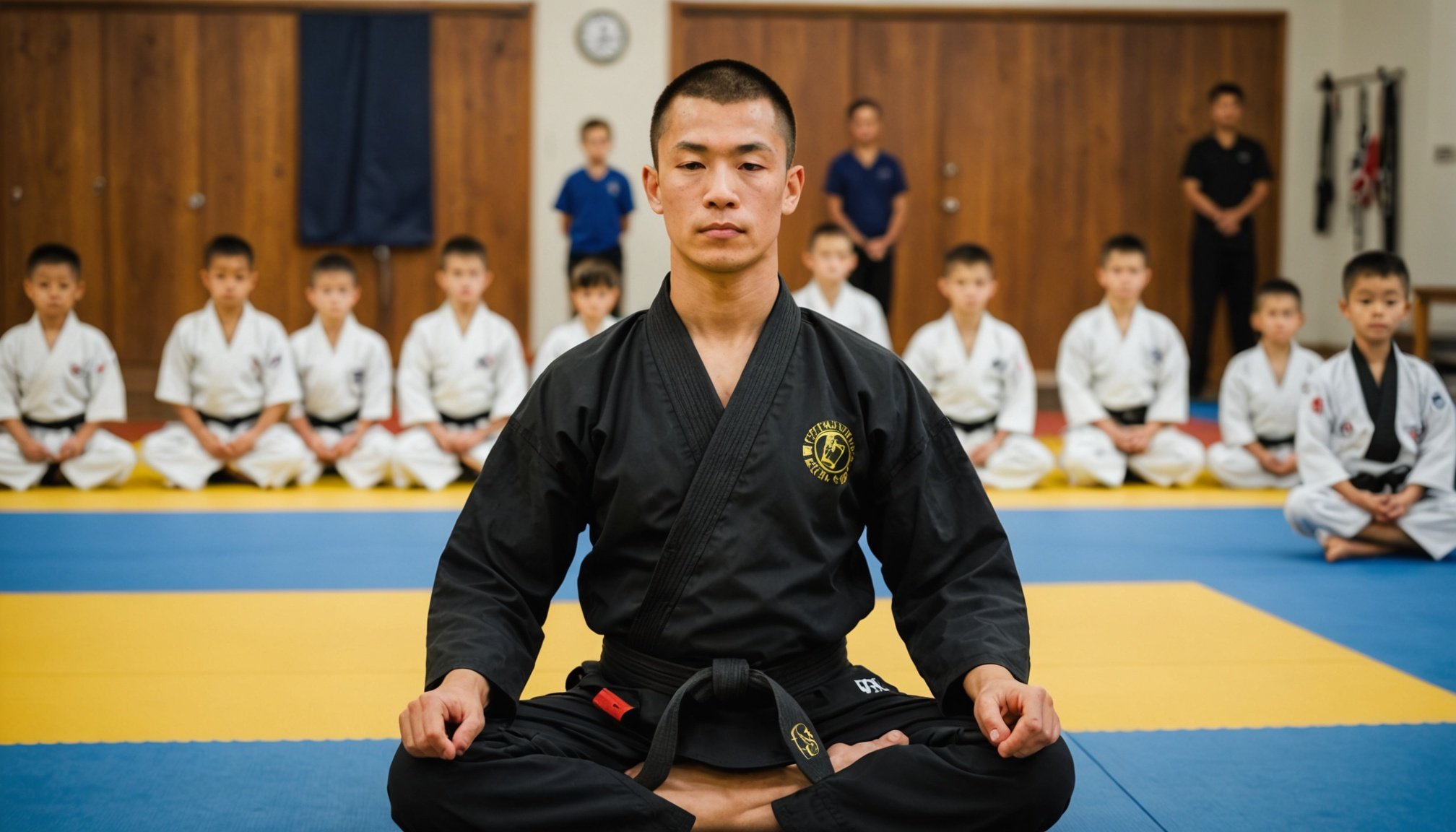Understanding Mindfulness in Martial Arts
Mindfulness in Martial Arts involves being fully present and aware of one’s actions, thoughts, and surroundings during practice and competing. It is a mental state that encourages focus and calmness, helping practitioners connect with their movements deeply. This mindful approach is rooted in various Eastern philosophies and is integral to martial arts’ training regimes, underscoring awareness and discipline.
Historically, mindfulness has held a significant place in martial arts. Its roots can be traced back to ancient practices where martial artists, especially practitioners of disciplines like Kung Fu and Tai Chi, embraced mindfulness techniques as part of their spiritual development. The objective was not merely to master combat skills but to cultivate inner peace and self-awareness.
Additional reading : Unlocking Explosive Power: A Guide to Plyometric Training for UK Wrestlers
Practicing mindfulness in martial arts has numerous benefits. Physically, it enhances coordination, balance, and reaction time. Mentally, it fosters stress reduction and sharpens concentration, promoting a sense of calm during training and competition. Techniques such as deep breathing, visualization, and meditation are commonly used to develop and refine mindfulness skills, reinforcing the connection between mind and body. Engaging in martial arts with mindfulness not only improves performance but also enriches the practitioner’s overall well-being.
Practical Strategies for Integrating Mindfulness
Integrating mindfulness into everyday routines has become an essential practice for enhancing mental well-being and focus. By employing mindfulness techniques, individuals can achieve greater emotional balance and clarity. One area where these strategies can have a profound impact is in educational settings, where they contribute to curriculum enhancement.
Also to discover : Unlocking the Advantages of Cross-Training in Brazilian Jiu-Jitsu for Wrestlers in the UK: A Path to Enhanced Performance
Mindful Breathing Techniques
Mindful breathing involves focusing attention on the breath, noticing each inhale and exhale. This technique helps to ground the mind and reduce stress. Incorporating these exercises into daily routines can serve as mental warm-ups, preparing both practitioners and students for engaging tasks.
Body Scan and Awareness Practices
Body scan exercises promote deep relaxation and heighten awareness. This involves mentally scanning the body from head to toe, identifying tension, and consciously releasing it. These sessions guide practitioners in tuning into physical sensations, promoting both concentration and relaxation.
Visualization Techniques
Visualization leverages imagery to boost focus and performance. This method involves picturing a calming scene or successful outcome, which helps in anchoring attention and improving task execution. By integrating these practices, one can enrich curriculum materials, making education not only more effective but also more mindful. Embracing these diverse techniques enables individuals to explore mindfulness more profoundly, leading to enhanced well-being and performance.
Case Studies of Mindfulness in UK Martial Arts Schools
The integration of mindfulness programs within UK martial arts schools demonstrates significant benefits both for instructors and students. Case studies reveal that schools embracing these programs report enhanced mental focus, reduced stress, and improved performance. One notable example is a Birmingham-based dojo, where enhanced training efficiency and student satisfaction followed the implementation of a structured mindfulness curriculum.
Testimonials from both instructors and students strengthen the argument for mindfulness adoption. An instructor from a London academy highlighted that students were “more grounded and focused,” while a student expressed feeling “more in control of emotions during high-pressure situations.” These qualitative points underline the impact of mindfulness on learners’ psychological well-being.
Feedback analysis reveals fascinating insights into the programs’ outcomes. Students reported a 30% improvement in concentration levels, measured through participatory assessments. Additionally, there was a noticeable improvement in emotional resilience, underscored by students’ capacity to manage anxiety during competitions. Instructors noticed a more cohesive training environment, described as a space where “students perform at their best.”
These case studies and testimonials underscore the transformative potential of mindfulness within the UK martial arts scene, encouraging broader adoption across schools seeking to cultivate a balanced training atmosphere.
The Impact of Mindfulness on Martial Arts Practitioners
Mindfulness can have a profound effect on martial artists, transforming their physical and mental approach to practice. Improved focus and concentration are among the most significant benefits. Practitioners often report that mindfulness helps them maintain mental clarity, allowing them to remain present during training and competitions. This focus not only enhances technique execution but also increases the opportunity for strategic thinking under pressure.
Another critical aspect of mindfulness is its role in emotional regulation. Being mindful assists practitioners in managing stress and anxiety, which are prevalent in both training and competitions. Techniques like deep breathing and meditation foster calmness and confidence, reducing performance-related stress.
Furthermore, mindfulness contributes to building resilience. Regular mindfulness practice can lead to increased self-awareness and emotional strength, enabling martial artists to bounce back from failures and setbacks more effortlessly. It encourages personal growth and fosters an adaptable mindset, crucial for any athlete.
The overall well-being of martial artists is also positively influenced by mindfulness. Emotional regulation, when combined with mental clarity and focus, leads to a more balanced lifestyle and enhances the overall quality of life. Integrating mindfulness practices into their routine empowers martial artists to achieve their potential both on and off the mat.
Tips for Instructors to Implement Mindfulness
Incorporating mindfulness into the classroom can greatly enhance the learning experience. Let’s explore some practical approaches.
Training and Resources for Instructors
For educators eager to embrace mindfulness, pursuing instructor training opportunities is crucial. Many organizations offer specialized programs that delve into techniques of mindfulness integration tailored for educational settings. These workshops empower instructors with the knowledge to seamlessly embed mindfulness in their teaching practices. Online platforms also provide resources, such as webinars and articles, which instructors can access at their convenience.
Creating a Mindfulness-Friendly Environment
Establishing a conducive atmosphere for mindfulness in classrooms necessitates a few thoughtful teaching tips. It begins with creating a calm, inclusive space where students feel safe to engage. Simple practices, like having a few minutes of deep breathing at the start of a class, can set a positive tone. Encouraging open discussions about emotions further fosters a supportive environment.
Measuring the Impact of Mindfulness Practices
To truly gauge the benefits of mindfulness initiatives, instructors should identify measuring tools that align with their goals. These may include surveys or feedback sessions, which provide insights on student engagement and emotional wellbeing. Through consistent evaluation, educators can refine their mindfulness strategies, ensuring long-term success.











